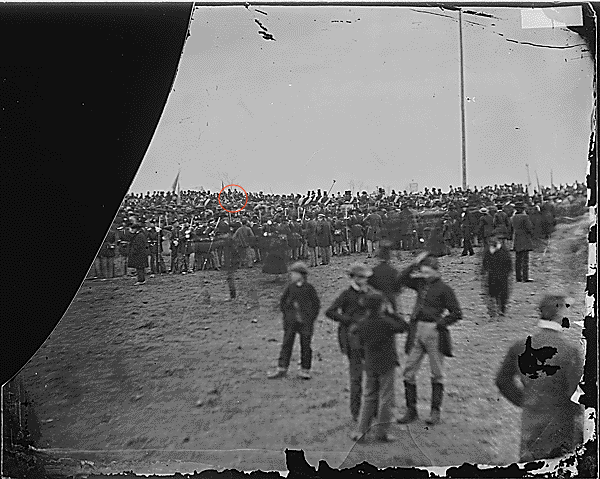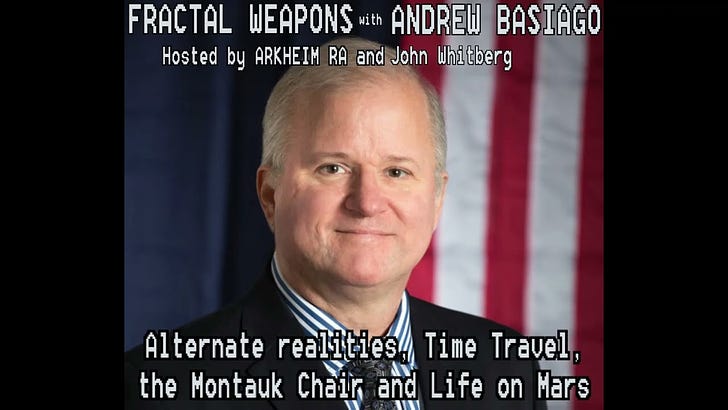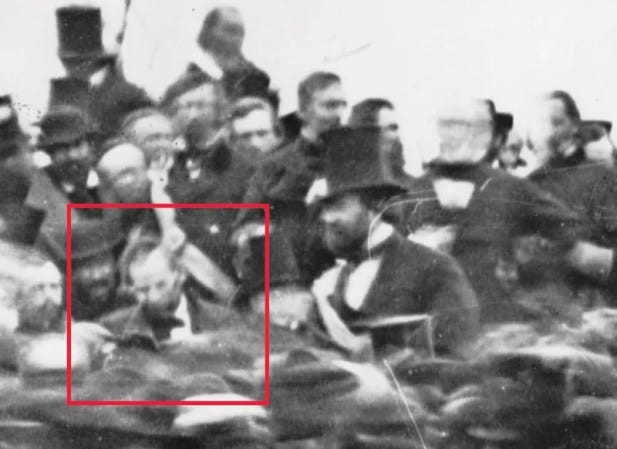Larry James - Time travel controller at the Montauk Project - part 3
"We changed the outcome of the Civil War"

Michael Houtzager (zager@webhoster.com) recorded this interview with engineer Larry James in the year, 2000. Michael’s web site is http://www.bielek.com/
(Continued from part 2 - https://dianabarahona.substack.com/p/larry-james-time-travel-controller)
52:00 MICHAEL: Well, when when time travel was actually accomplished, was there a lot of excitement, a lot of attention? I mean, this to me is a very significant thing.
LARRY: Well, I don't know that there was so much excitement per se. There may have been for other people. It was more like, “Well, you know, we've been working on this for years, and we've picked it apart and picked it apart and picked it apart, and finally we've got something here. And we've obtained our goal, and we've already prepared what we're going to do with it by this point.
MICHAEL: But just say, from the outside—I mean all the people who were spending the billions of dollars—I would imagine there must have been some showing of gratitude and pleasure or whatever that this thing had finally been accomplished. Or was it all just so robotic?
LARRY: I'm sure there was.
MICHAEL: No champagne bottles popping, corks flying in the air? You know, “Wow, we have time travel!”
LARRY: No, it's just basically, “Okay, we finally achieved our objective. All right, now let's continue on doing what we wanted to do.
MICHAEL: So, you guys didn't party much down there, did you?
LARRY: We didn’t. I'm sure others did, but we didn’t. We had finally achieved another phase, basically. I mean, you didn't party every time you achieved a new phase.
MICHAEL: Well, we do around here.
LARRY: Well, some people do.
MICHAEL: We look forward to the next phase. So, everybody I talked to on this project, I always get the sense that it was very focused, very strict, very unemotional.
LARRY: You almost had to be with it.
MICHAEL: Yeah, very unemotional. That's why the partying wasn't there. It was like, “Okay, boom. We're done, now let's move to the next thing.” Almost like, you know, you were controlled in a sense.
Almost like, you know, you were controlled in a sense.
LARRY: We knew that we were working on something big, and it's something that is bigger than the average person. And so, the average person is going to have a hard time dealing with it to begin with, period. And of course, you also have to be prepared for abuses as far as, once you have something as sensitive as time control, you want to be careful with it, because you don't want it falling into the wrong hands.
MICHAEL: What could happen if it did fall into the wrong hands?
55:00 LARRY: Oh let's say you get a world leader who’s— like Saddam Hussein, who even his own people consider mad to a certain extent, and he wants to use it to change the Gulf War. I mean, that's very dangerous stuff there. So, yeah, you want to keep it out of his hands, just like you want to keep a nuke out of that man's hands.
Sue Ann Arrigo (b.1954) was a licensed California medical doctor with specialized training in nephrology until leaving her CIA cover-life in 2006 in a successful move to publicize her detailed insider knowledge to avert the planned global nuclear war by ‘pre-emptive strike’. https://dianabarahona.substack.com/p/the-cia-oracle-sue-ann-arrigo-md
MICHAEL: Well, hopefully, it is so complicated that someone like him could not replicate the work you did.
LARRY: Well, see, that was the thing: what we were doing, as we were making our breakthroughs, we were simplifying, also, so it became easier as time went on.
MICHAEL: So, I mean, theoretically—here it is 2000—it's possible, say, 2010, if Saddam Hussein was still alive, [that] he gives someone a billion dollars, buys one of these machines, and goes back and changes the outcome of the war.
LARRY: Yeah, and that's why it has to be— We knew at the time that you have to be very careful with this, make sure it doesn't fall into the wrong hands.
MICHAEL: But you and I just yesterday looked at some catalogs where you can buy some of this equipment.
LARRY: Well, yeah. Government contractors build the equipment, but unless you know what it's for, it doesn’t do you much good, I mean, you can use it for different applications, I’m sure, but—
MICHAEL: Right. Like microwaving eggs on the side of a roof, but not time travel, right? Because there's a lot of different pieces involved.
LARRY: Yeah, a lot of different pieces involved. You have to hit the right frequencies.
MICHAEL: Right, and you can't do that with just one piece of equipment. Who do you actually think has time-travel capability right now?
LARRY: There's actually more than one group. Once we had made our breakthroughs—and we were able to still work quite privately for awhile without many people knowing about it—other groups started getting involved and wanting to take control for their own personal gain. And so, things kind of got out of control there, which is what we were trying to avoid. But there again, if you want to keep a secret, you keep it to yourself.
MICHAEL: But here's this is what I think our listeners are going to find find challenging, mentally challenging to process. We had talked earlier that you went back and actually re-engineered the outcome of the Civil War.
LARRY: Yes.
58:00 MICHAEL: So, could I assume then that up to that point in time—say, up to 1980—that the South had actually won the Civil War?
LARRY: Well, see, that's on a different time plane, though. It's in a parallel universe. As we talked before, we know that there are several parallel universes. And we can assume that, yeah, that did happen that way, but in a parallel universe.
MICHAEL: But if you wanted to go back and change that— For instance, when you were in the early 1980s and had undertaken that project to go back and change the outcome of the Civil War—
LARRY: Yeah.
MICHAEL: —what was your reality at that point in time? Was it that the South had won, or was it that the North had won?
LARRY: I believe at that time that was the South that had won, and that was one of the things that we had changed.
MICHAEL: Okay. So, you're saying only for the group of people that were involved in the project do they have any memory of that reality.
LARRY: That's true.
MICHAEL: All the rest of us, myself included—
LARRY: —have an alternate reality.
MICHAEL: —have an alternate reality where all we can remember and experience is that the North had won.
LARRY: That's correct.
MICHAEL: That's hard to buy. But you're saying that's correct.
LARRY: Yeah.
MICHAEL: And I'm not saying that that that's wrong; I'm just saying you have to really expand your mind to think about that.








Abraham Lincoln's stature, was that of a 6'4" tall. lean man. Would you take a look at the GIANT standing next to him!!!